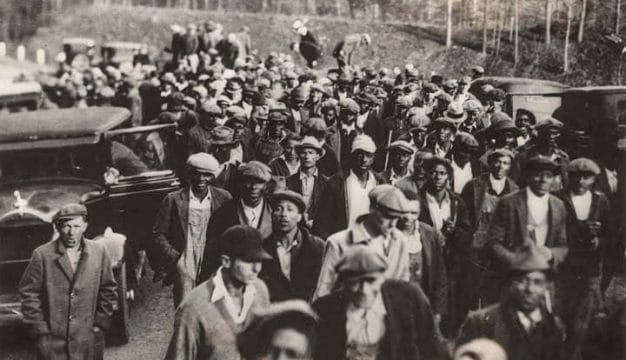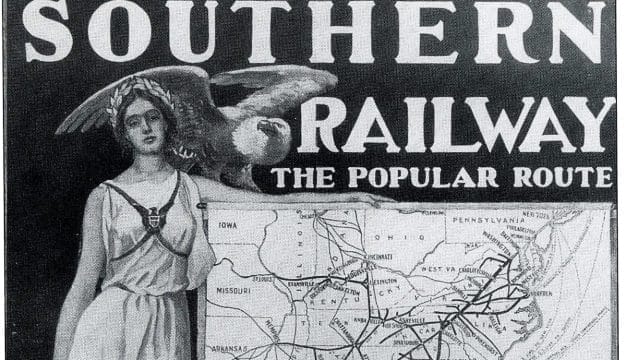Virgil Trucks
Professional baseball pitcher Virgil Oliver Trucks (1919-2013) came out of Depression-era Alabama as a minor-league sensation by striking out 420 batters in a season. As a major league pitcher, he helped the Detroit Tigers win the 1945 World Series, and later in his career he pitched two 1-0 no-hitters during the same season—a feat accomplished only three times in major league history. He was nicknamed “Fire” Trucks for the speed of his pitching style.
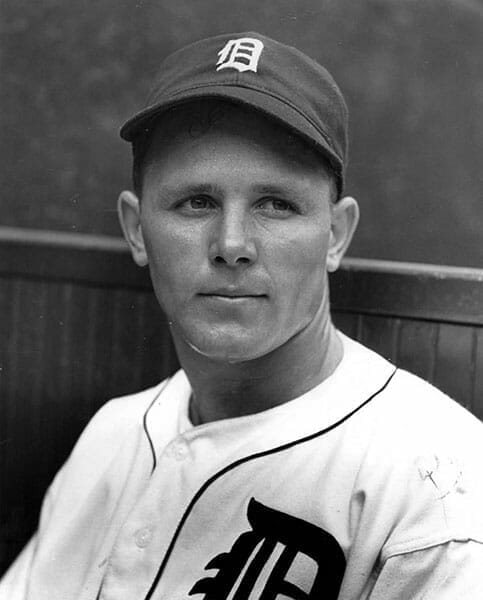 Virgil Trucks
Virgil Oliver Trucks was born to Lula Belle and Oliver Trucks in Birmingham, Jefferson County, on April 26, 1919. He was the fourth of 13 siblings. In 1935 and 1936, Trucks played on Birmingham sandlot teams as an infielder and outfielder. His performance drew the attention of a Detroit Tigers scout who, in 1937, signed Trucks out of high school to a contract that included a $100 bonus. The scout, however, failed to submit Trucks’s contract, an illegal but not uncommon practice that enabled teams to hide and stockpile players. In 1937, Trucks played for Shawmut, a semi-pro team in the Chattahoochee Valley League, where he switched positions to pitcher. Trucks joined the Andalusia, Covington County, franchise of the Class D Alabama-Florida League at the end of the 1937 season.
Virgil Trucks
Virgil Oliver Trucks was born to Lula Belle and Oliver Trucks in Birmingham, Jefferson County, on April 26, 1919. He was the fourth of 13 siblings. In 1935 and 1936, Trucks played on Birmingham sandlot teams as an infielder and outfielder. His performance drew the attention of a Detroit Tigers scout who, in 1937, signed Trucks out of high school to a contract that included a $100 bonus. The scout, however, failed to submit Trucks’s contract, an illegal but not uncommon practice that enabled teams to hide and stockpile players. In 1937, Trucks played for Shawmut, a semi-pro team in the Chattahoochee Valley League, where he switched positions to pitcher. Trucks joined the Andalusia, Covington County, franchise of the Class D Alabama-Florida League at the end of the 1937 season.
Trucks became the minor league sensation of the 1938 season in Andalusia. He went 25-6, threw two no-hitters, and struck out 420 hitters, a minor league record that stood for eight years. With an overpowering fastball clocked in excess of 100 mph, the young pitcher was compared inevitably with Cleveland Indian Bob Feller, who also had an overwhelming fastball. Andalusia sold Trucks’s contract to the Detroit Tigers, and he spent the next three years (1939-1941) in the Detroit farm system. He threw two additional no-hitters while pitching for Class D Alexandria, Louisiana; Class B Beaumont, Texas; and Class AA Buffalo, New York.
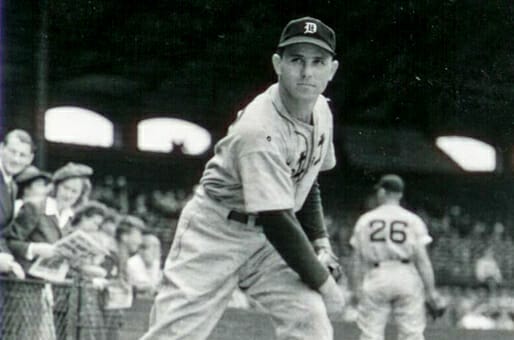 Virgil Trucks Warming Up
In 1942, Trucks joined the Tigers’ starting rotation, which included Hal Newhouser and Dizzy Trout. In 1942 and 1943, he compiled 14-8 and 16-11 records with outstanding earned run averages, 2.74 and 2.84, respectively. With World War II reaching its apex, Trucks joined the U.S. Navy to play with Mickey Cochran’s Great Lakes Naval Base team. In September 1944, he was ordered to Hawaii to participate in the Service World Series against the Army and won two of three starts as the Navy took the series. In February 1945, he was sent to Guam, where he maintained playing fields and organized athletic contests as a recreational specialist. During his two-year stint in the Navy, his record was 28-1. He was discharged from the service in late September in time to return to the Tigers and start the game that clinched the team’s 1945 American League pennant, a game eventually won by teammate Hal Newhouser. Trucks pitched the second game of the 1945 World Series against the Chicago Cubs, winning 4-1 as the Tigers prevailed overall in the series 4-3. Because of this twist of events, Trucks is, so far, the only pitcher to win more games in the World Series than he did during the regular season.
Virgil Trucks Warming Up
In 1942, Trucks joined the Tigers’ starting rotation, which included Hal Newhouser and Dizzy Trout. In 1942 and 1943, he compiled 14-8 and 16-11 records with outstanding earned run averages, 2.74 and 2.84, respectively. With World War II reaching its apex, Trucks joined the U.S. Navy to play with Mickey Cochran’s Great Lakes Naval Base team. In September 1944, he was ordered to Hawaii to participate in the Service World Series against the Army and won two of three starts as the Navy took the series. In February 1945, he was sent to Guam, where he maintained playing fields and organized athletic contests as a recreational specialist. During his two-year stint in the Navy, his record was 28-1. He was discharged from the service in late September in time to return to the Tigers and start the game that clinched the team’s 1945 American League pennant, a game eventually won by teammate Hal Newhouser. Trucks pitched the second game of the 1945 World Series against the Chicago Cubs, winning 4-1 as the Tigers prevailed overall in the series 4-3. Because of this twist of events, Trucks is, so far, the only pitcher to win more games in the World Series than he did during the regular season.
From 1946 to 1952, Trucks pitched for the Tigers, winning 78 games and losing 73. With a baseball salary of only $3,500 in 1946, Trucks, like most major leaguers, worked during the off season to make ends meet. He was employed by the city of Birmingham and by the Alabama Great Southern Railroad as a switchman. In addition, he earned $2,000 to $3,000 during the postseason with exhibition, or “barnstorming,” teams organized by Bob Feller and Harry Walker. By 1951, he was making a baseball salary of $10,000, and during his last season in 1958 he made $28,500.
Trucks regularly faced two of the era’s greatest hitters in Joe DiMaggio and Ted Williams. He fared well against the right-handed DiMaggio but gave up more than a few home runs to the left-handed Williams—a hitter he loved to challenge. In 1952, Trucks suffered through his most trying season, posting a 5-19 record. Ironically during that season, he pitched 1-0 no-hitters against the Washington Senators and the New York Yankees, a feat matched only by Johnny Vander Meer, Allie Reynolds, and Nolan Ryan.
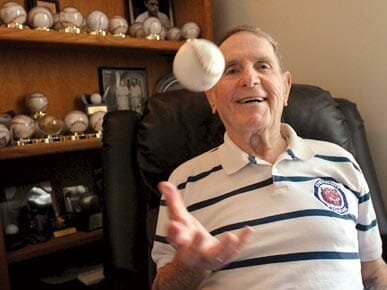 Virgil Trucks
At the end of 1952, Trucks was traded to the St. Louis Browns. Despite having been raised in Jim Crow-era Alabama, Trucks began a lifelong friendship with teammate and former Negro League baseball great Leroy “Satchel” Paige, who had been hired by the Browns in 1951. Trucks won five games for the team in 1953 but then was traded during the season to the Chicago White Sox. With the Sox, he developed a change-up pitch that helped him win an additional 15 games, making him a 20-game winner for the first time. In 1954 and 1955, Trucks went 19-12 and 13-8, respectively. He completed the last three seasons of his major league career as a reliever and part-time starter back in Detroit, followed by stints in Kansas City and in New York, with the Yankees.
Virgil Trucks
At the end of 1952, Trucks was traded to the St. Louis Browns. Despite having been raised in Jim Crow-era Alabama, Trucks began a lifelong friendship with teammate and former Negro League baseball great Leroy “Satchel” Paige, who had been hired by the Browns in 1951. Trucks won five games for the team in 1953 but then was traded during the season to the Chicago White Sox. With the Sox, he developed a change-up pitch that helped him win an additional 15 games, making him a 20-game winner for the first time. In 1954 and 1955, Trucks went 19-12 and 13-8, respectively. He completed the last three seasons of his major league career as a reliever and part-time starter back in Detroit, followed by stints in Kansas City and in New York, with the Yankees.
Overall in his major league career, Trucks won 177 games, lost 135, and struck out 1,534 batters. He compiled a 3.39 earned run average, threw 124 complete games, had 33 shutouts, and played in the 1951 and 1954 All-Star games. He also had two no-hitters during the 1952 season. Trucks remained affiliated with baseball as a coach and scout with the Pittsburgh Pirates, Atlanta Braves, and Detroit Tigers through 1974. Trucks married four times and fathered five children. He lived in Calera, Shelby County, until his death on March 23, 2013. His nephew, Claude “Butch” Trucks, was a founding member of the Allman Brothers Band.
Additional Resources
Marshall, William. Oral History interview with Virgil Trucks. Birmingham, Ala., May 11, 1988 (88OH80, Special Collections and Digital Programs, University of Kentucky Libraries).
Trucks, Virgil. Throwing Heat: The Life and Times of Virgil “Fire” Trucks. Dunkirk, Md.: Pepperpot Productions, 2004.
